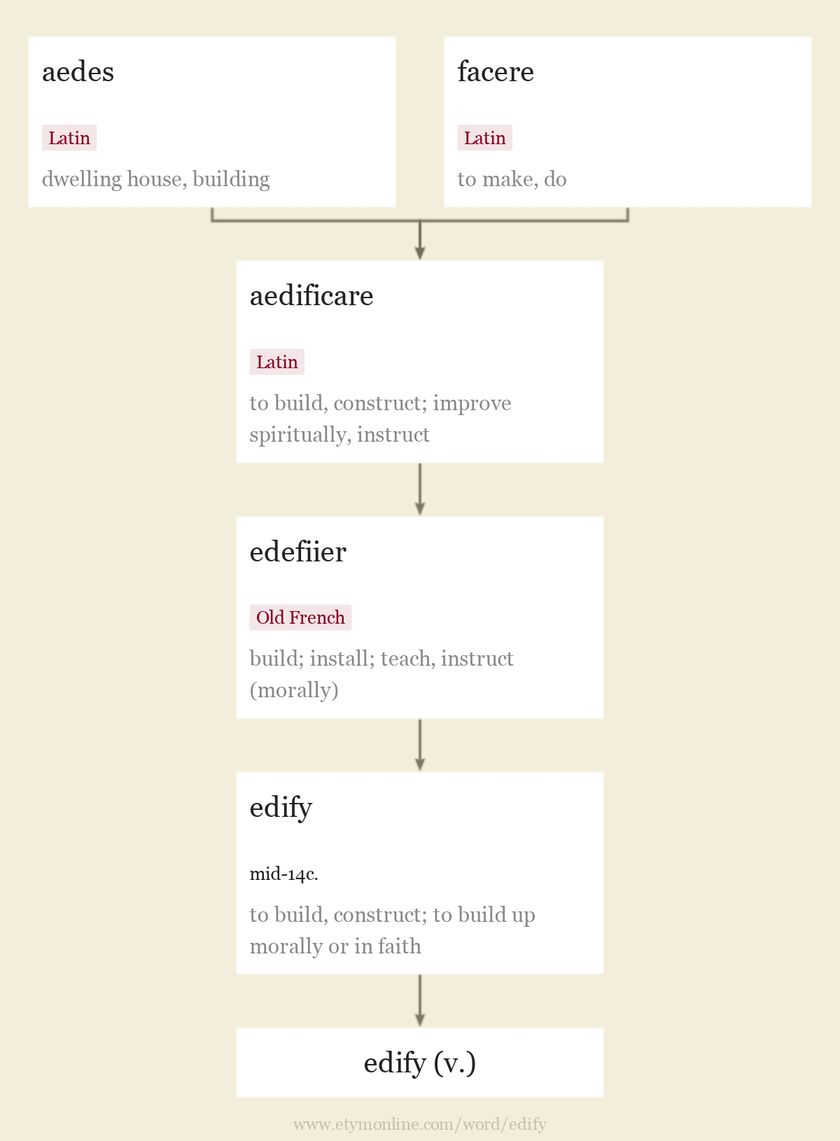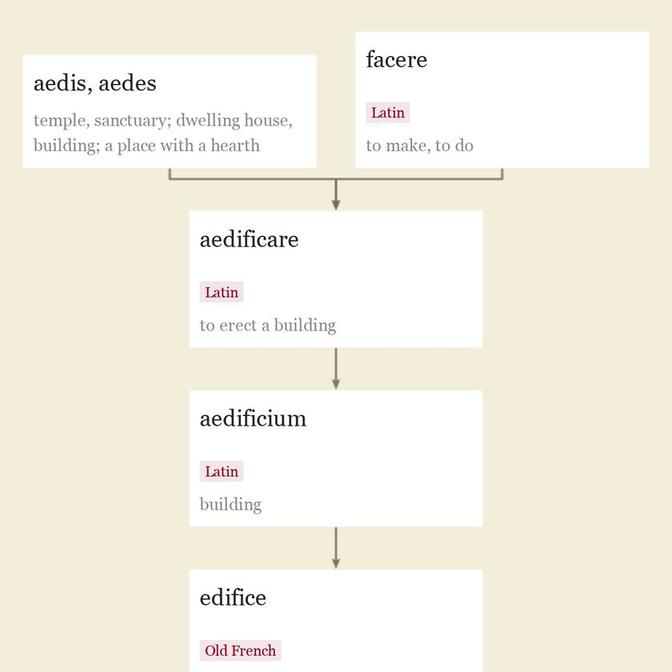edify (v.)
14世纪中叶,“建造,构建”,在比喻意义上也指“在道德或信仰上建立”,源自古法语 edefiier(12世纪,现代法语 édifier)“建造; 安装; 教导,道德教育”,源自拉丁语 aedificare “建造,构建”,在晚期拉丁语中意为“在精神上提高,教导”(参见 edifice)。相关词汇: Edified; edifying。

edify 的相关词汇

14世纪晚期,来自古法语 edifice “建筑物”(12世纪),源自拉丁语 aedificium “建筑物”,来自 aedificare “建造建筑物”,源自 aedis,是 aedes 的变体,意为“寺庙,圣所”,通常是没有隔断的单一建筑物,在复数形式中也可以表示“住宅,建筑物”,最初是指“有壁炉的地方”+ facere 的组合形式,意为“制造,做”(来自 PIE 词根 *dhe- “设置,放置”)。
Aedis 来自 PIE 词根 *eidh- “燃烧,燃烧”(源头还包括梵语 inddhe “突然燃烧”; 阿维斯塔语 aesma- “柴火”; 希腊语 aithein “燃烧”, aithos “火”; 拉丁语 aestas “夏天”, aestus “热”; 立陶宛语 iesmė “柴火”; 古爱尔兰语 aed “火”,威尔士语 aidd “热情,热忱”; 古英语 ād,古高地德语 eit “火葬堆”,古诺尔斯语 eisa “燃烧的煤炭”),这可能与词根 *as- “燃烧,发光”有关。
*dhē-,原始印欧词根,意为“设定,放置”。
它构成以下词汇的全部或部分: abdomen; abscond; affair; affect(第一动词)“在心中留下印象”; affect(第二动词)“假装”; affection; amplify; anathema; antithesis; apothecary; artifact; artifice; beatific; benefice; beneficence; beneficial; benefit; bibliothec; bodega; boutique; certify; chafe; chauffeur; comfit; condiment; confection; confetti; counterfeit; deed; deem; deface; defeasance; defeat; defect; deficient; difficulty; dignify; discomfit; do(动词); doom; -dom; duma; edifice; edify; efface; effect; efficacious; efficient; epithet; facade; face; facet; facial; -facient; facile; facilitate; facsimile; fact; faction(名词1)“政党”; -faction; factitious; factitive; factor; factory; factotum; faculty; fashion; feasible; feat; feature; feckless; fetish; -fic; fordo; forfeit; -fy; gratify; hacienda; hypothecate; hypothesis; incondite; indeed; infect; justify; malefactor; malfeasance; manufacture; metathesis; misfeasance; modify; mollify; multifarious; notify; nullify; office; officinal; omnifarious; orifice; parenthesis; perfect; petrify; pluperfect; pontifex; prefect; prima facie; proficient; profit; prosthesis; prothesis; purdah; putrefy; qualify; rarefy; recondite; rectify; refectory; sacrifice; salmagundi; samadhi; satisfy; sconce; suffice; sufficient; surface; surfeit; synthesis; tay; ticking(名词); theco-; thematic; theme; thesis; verify。
它是以下词汇的假定来源/其存在的证据为:梵语 dadhati “放置,安排”; 阿维斯塔语 dadaiti “他放置”; 古波斯语 ada “他制造”; 赫梯语 dai- “放置”; 希腊语 tithenai “放置,设置,安置”; 拉丁语 facere “做,干; 执行; 带来”; 立陶宛语 dėti “放置”; 波兰语 dziać się “正在发生”; 俄语 delat' “做”; 古高地德语 tuon,德语 tun,古英语 don “做”。